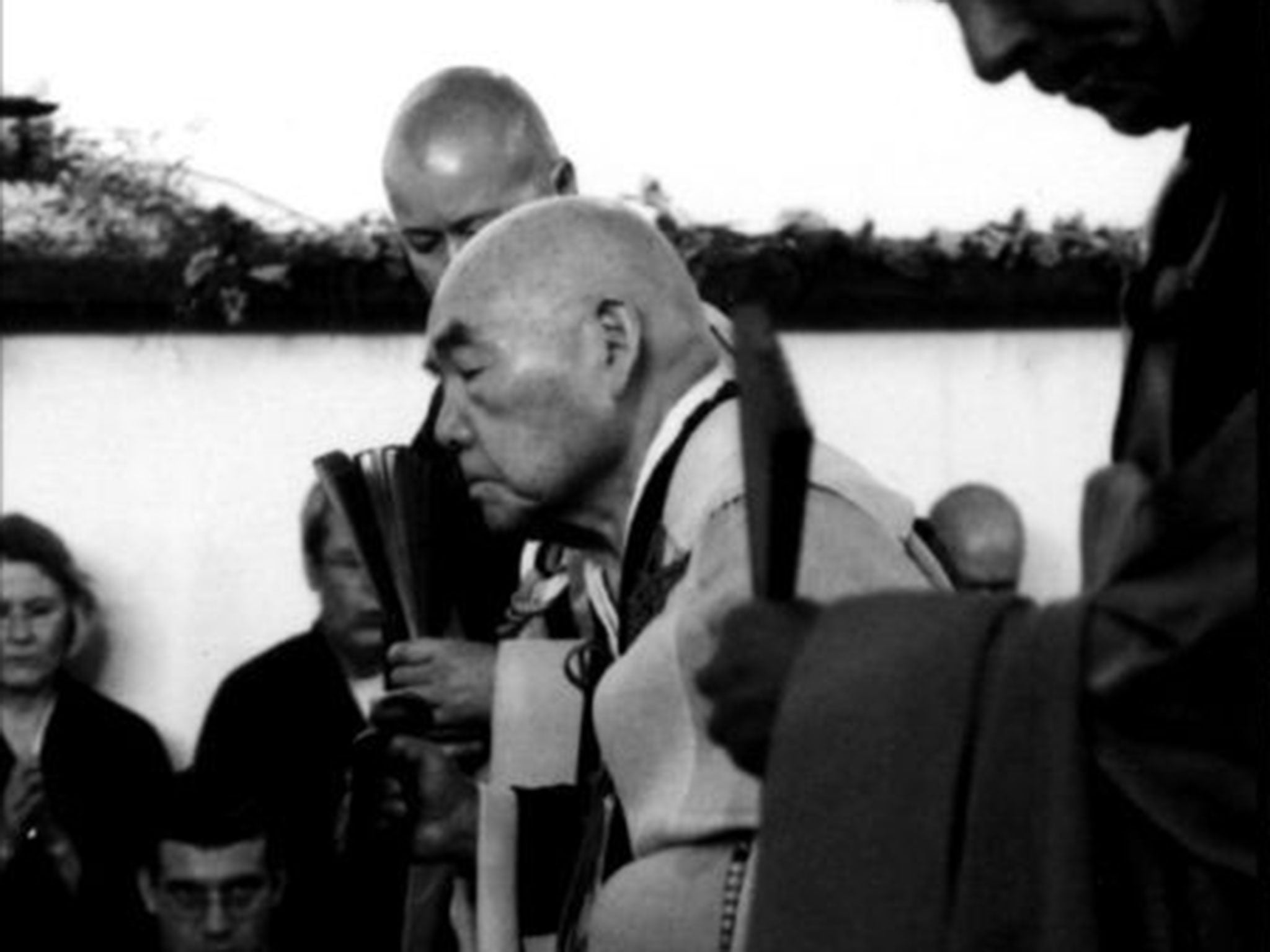Kyozan Joshu Sasaki: Zen monk who established a network of monasteries but whose career was overshadowed by accusations of abuse
Students would pay hundreds of dollars for a week of 18-hour meditation sessions

Kyozan Joshu Sasaki was a Japanese monk who over 50 years became one of the most influential Zen Buddhist teachers in the US, establishing a number of temples and teaching the thousands who passed through his rigorous and strict brand of Zen practice.
However, his character, reputation and legacy came under scrutiny following allegations that he had sexually abused female students for decades. The allegations began to surface on a Zen website in 2012, although there had been decades of rumour and speculation.
A council of senior Zen teachers from the Rinzai-ji Zen Centre in Los Angeles, ordained under Sasaki, admitted that they had known of the accusations but had not acted. In an open letter of apology, they admitted, “Our hearts were not firm enough, our minds were not clear enough, and our practices were not strong enough so that we might persist until the problem was resolved.” Sasaki had retired the previous year after developing aspiration pneumonia, and he retained the title as abbot of the LA centre until last year but never publicly responded to the charges.
Following the initial complaint, former students began to come forward in their hundreds and internet discussion boards were inundated with accusations of repeated groping of female students during interviews, of affairs with female students and Buddhist nuns, and of his molesting or coercing hundreds of others into having sexual contact with him during one-on-one training sessions or after-hours “tea” meetings at his LA centre and his retreat camps.
Sasaki would claim that sexual contact with a Zen master, or roshi – “venerable teacher” – would help them attain new levels of “non-attachment”, one of Zen’s central objectives. In 2013 an independent panel of Buddhist leaders determined that the allegations were fundamentally indisputable. The panel’s report said students had complained to Sasaki’s staff about his behaviour since the early 1960s, and that those “who chose to speak out were silenced, exiled, ridiculed or otherwise punished.” The panel noted that over the years a few women had gone to the police but no charges were ever brought.
There were many, however, that argued that even if the allegations were true, Sasaki would never have acted deceptively or with intent to cause harm. Harold Roth, a Religious Studies Professor of Brown University, Rhode Island, and former student of Sasaki, said, “The idea that he was a predator is mistaken. Everything he did was in the devoted service of awakening enlightenment in his students.”
Born near Sendai in the Miyagi prefecture on the north-eastern coast of Japan in 1907, Kyozan Joshu Sasaki was the son of peasant farmers. Initially he wanted to be a soldier but at 13 he began religious studies and became a Zen Buddhist novice at a temple in Sapporo on Hokkaido. Over the next seven years he was schooled in the 13th-century disciplinary traditions of Rinzai.
Sasaki regularly experienced 16-hour days of meditation, abrupt and sometimes shouted interrogations in the koan mysteries, baffling questions pointing at some ultimate truth –“How do you experience God when you hear the sound of my stick?” – and occasional blows to the head with a stick, all in the service of inspiring satori, an awakening of consciousness.
After years of training, in 1947, Sasaki was awarded the title of roshi, or master, and became abbot at the Yotoku-in temple. Six years later he was appointed abbot of Shojuan, near Nagano. In 1962 following a request from a group in the US, Sasaki travelled there, arriving with little more than a spare robe, a pair of dictionaries, Japanese to English and English to Japanese, and an invitation to teach Zen Buddhism.
He established the Zen centre in LA with retreats in California and New Mexico where students pay hundreds of dollars for a week’s bed, board and arduous sessions. Dressed in black robes, they strive to live in the moment and awake to the oneness of everything by rising at 3am for 18-hour sessions sitting lotus-style in the zendo, or meditation hall, eating communal vegan meals in silence, chanting and taking restorative dips in the hot pools.
Sasaki also taught internationally and, along with Zen monks and nuns he had trained, established a network of about 30 affiliated Zen centres throughout North America and Europe; a number cut their ties with him in the wake of the sex-abuse allegations.
He once promised his students he wouldn’t die “until Zen is born in America.” According to one commentator, his behaviour was all too typical of the early generation of Japanese teachers in the US, who arrived just in time for the explosion of interest in Eastern religion. They often embodied the dark side of the sexual revolution that was also underway.
Perhaps his most prominent student was Leonard Cohen, who spent much of the 1990s cloistered at Mount Baldy, re-emerging in a burst of creativity and claiming that his relationship with Sasaki was “a liberating kind of love.”
Kyozan Joshu Sasaki, Zen Buddhist teacher: born Miyagi prefecture, Japan 1 April 1907; married Haruyo; died Los Angeles 27 July 2014.
Subscribe to Independent Premium to bookmark this article
Want to bookmark your favourite articles and stories to read or reference later? Start your Independent Premium subscription today.

Join our commenting forum
Join thought-provoking conversations, follow other Independent readers and see their replies